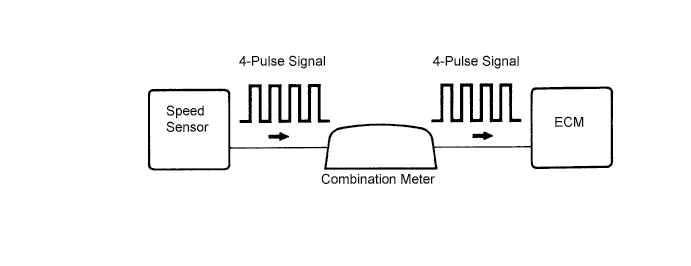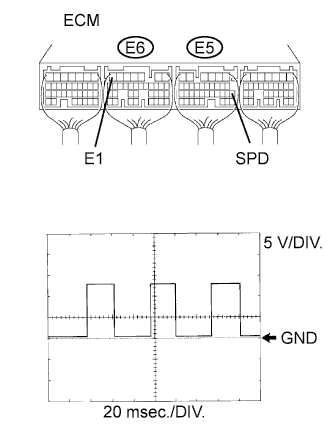Dtc P0500/42 Vehicle Speed Sensor A
DESCRIPTION
WIRING DIAGRAM
INSPECTION PROCEDURE
When using intelligent tester:
CHECK COMBINATION METER (OPERATION OF SPEEDOMETER)
READ VALUE USING INTELLIGENT TESTER (VEHICLE SPEED)
CHECK ECM (SPD SIGNAL)
When not using intelligent tester:
CHECK COMBINATION METER (OPERATION OF SPEEDOMETER)
CHECK ECM (SPD SIGNAL)
DTC P0500/42 Vehicle Speed Sensor "A" |
DESCRIPTION
The vehicle speed sensor outputs a 4-pulse signal for every revolution of the rotor shaft, which is rotated by the transmission output shaft via the driven gear. After this signal is converted into a more precise rectangular waveform by the waveform shaping circuit inside the combination meter, it is then transmitted to the ECM. The ECM determines the vehicle speed based on the frequency of these pulse signals.DTC No.
| DTC Detection Condition
| Trouble Area
|
P0500/42
| Conditions (a), (b) and (c) continue for 7 seconds or more:
(1 trip detection logic)
(a) Engine coolant temperature is more than 70°C (158°F)
(b) Engine speed is between 2,650 rpm and 3,500 rpm
(c) No speed signal is input to ECM
| - Open or short in speed sensor circuit
- Speed sensor
- Combination meter
- ECM
|
WIRING DIAGRAM
INSPECTION PROCEDURE
- HINT:
- Read freeze frame data using the intelligent tester. Freeze frame data records the engine conditions when a malfunction is detected. When troubleshooting, freeze frame data can help determine if the vehicle was running or stopped, if the engine was warmed up or not, and other data from the time the malfunction occurred.
- NOTICE:
- If the ECM is replaced, the new ECM needs initialization (Toyota Fortuner RM0000012X2005X.html).
When using intelligent tester:
| 1.CHECK COMBINATION METER (OPERATION OF SPEEDOMETER) |
Check the speedometer reading in the combination meter.
- HINT:
- If the vehicle speed sensor has any malfunctions, the speedometer shows abnormal readings.
- OK:
- Speedometer operates normally.
| | CHECK SPEEDOMETER CIRCUIT (INCLUDING SPEED SENSOR) |
|
|
| 2.READ VALUE USING INTELLIGENT TESTER (VEHICLE SPEED) |
Connect the intelligent tester to the DLC3.
Start the engine and turn the intelligent tester ON.
Enter the following menus: Powertrain / Engine / Data List / Vehicle Speed.
While the vehicle is running, check the vehicle speed at an engine speed of 2,000 rpm or more.
- OK:
- Same value as actual vehicle speed.
| | CHECK FOR INTERMITTENT PROBLEMS |
|
|
While idling the engine, check the waveform of the ECM connectors using an oscilloscope.
Move the shift lever to N.
Jack up the vehicle.
Turn the ignition switch ON.
Measure the voltage of the ECM connectors as the wheel is turned slowly.
- OK:
Tester Connection
| Specified Condition
|
E5-17 (SPD) - E6-7 (E1)
| Correct waveform is as shown
|
Tool Setting
| Condition
|
5 V/DIV., 20 msec./DIV.
| Turn the rear wheel slowly
|
- HINT:
- When the wheel is turning slowly, voltage is output intermittently.
| | REPAIR OR REPLACE HARNESS AND CONNECTOR |
|
|
When not using intelligent tester:
| 1.CHECK COMBINATION METER (OPERATION OF SPEEDOMETER) |
Check the speedometer reading in the combination meter.
- HINT:
- If the vehicle speed sensor has any malfunctions, the speedometer shows abnormal readings.
- OK:
- Speedometer operates normally.
| | CHECK SPEEDOMETER CIRCUIT (INCLUDING SPEED SENSOR) |
|
|
While idling the engine, check the waveform of the ECM connectors using an oscilloscope.
Move the shift lever to N.
Jack up the vehicle.
Turn the ignition switch ON.
Measure the voltage of the ECM connectors as the wheel is turned slowly.
- Standard voltage:
Tester Connection
| Specified Condition
|
E5-17 (SPD) - E6-7 (E1)
| Correct waveform is as shown
|
Tool Setting
| Condition
|
5 V/DIV., 20 msec./DIV.
| Turn the rear wheel slowly
|
- HINT:
- When the wheel is turning slowly, voltage is output intermittently.
| | REPAIR OR REPLACE HARNESS AND CONNECTOR |
|
|



